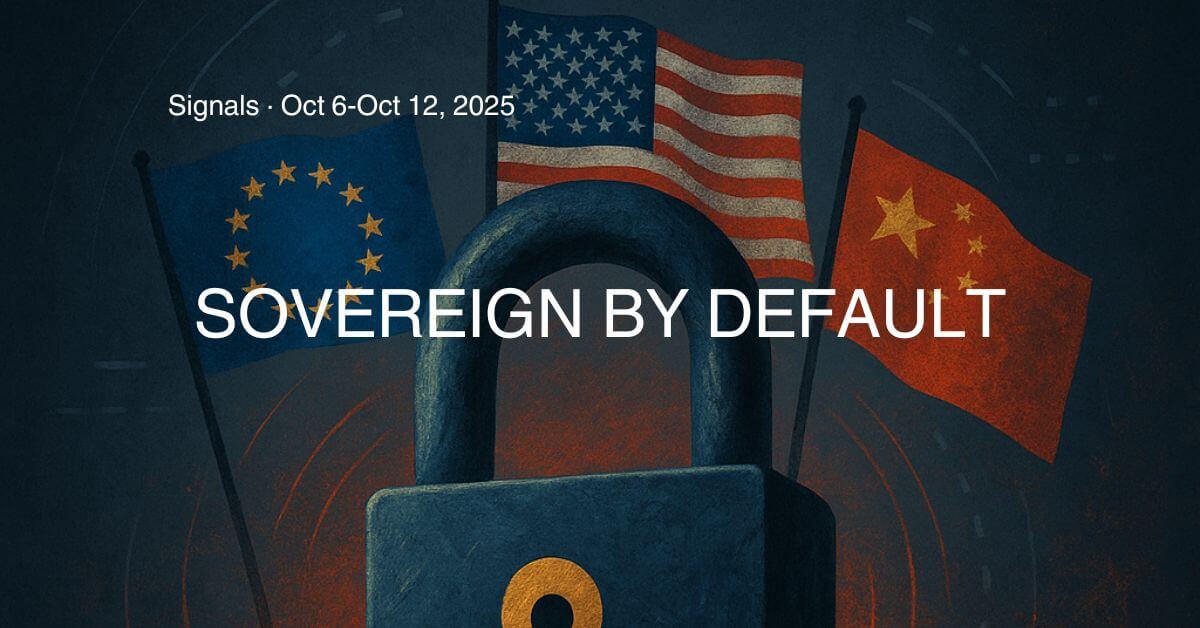Key Takeaways
- Sovereignty becomes the new default. EU buyers are demanding data residency, sovereign Key Management System (KMS), and certified hosting before procurement even begins.
- Compliance clocks accelerate. California, China, and the EU all tightened timelines, pushing security automation from “nice-to-have” to survival tool.
- Global vendors scramble to localize. Partnerships such as Bitdefender–OVHcloud and Eviden–Cosmian mark a structural pivot toward sovereign SKUs and region-bound control planes.
Macro Outlook
The regulatory tide has turned into a current.
What began as privacy (and political) rhetoric is now shaping business models and revenue forecasts.
In one week, California mandated one-click global opt-out and shorter breach-notice windows. China cut incident-reporting to four hours for critical operators. The EU’s Cyber Resilience Act officially started its compliance countdown. Together, they define a growing theme: governments no longer trust global uniformity.
Enterprise buyers, especially across Europe’s regulated sectors, are following. Procurement is increasingly gated by data-sovereignty proof, not merely data protection claims. Vendors unable to demonstrate local hosting, sovereign encryption key control, and conformity with NIS2, Data Subject Access Request (DORA), and national-cloud certifications are being disqualified before commercial discussions start.
This shift is not ideological anymore. Each new breach and audit failure increases the perceived risk of shared infrastructure. Boards have realized that sovereignty reduces the blast radius, simplifies audit evidence, and transfers some liability back to suppliers.
Signals from the Field
1. Bitdefender + OVHcloud (SecNumCloud)
Bitdefender announced GravityZone availability on OVHcloud SecNumCloud, the French government-approved sovereign cloud tier. The integration aligns with the French Cybersecurity Agency (ANSSI) criteria for data residency and auditability, effectively opening the door to public-sector and OT tenders across France and adjacent markets.
2. Eviden + Cosmian KMS
Eviden (Atos Group) paired with Cosmian to embed sovereign key management into its portfolio. The move extends privacy-preserving encryption under customer control—a differentiator for financial and healthcare RFPs shaped by DORA.
3. German Alignment via Secunet
Bitdefender also partnered with Secunet, Germany’s federal-grade cybersecurity provider, signaling an intent to replicate the French model across DACH markets where compliance-driven buyers dominate.
4. National Timelines Compress
- California: breach notices shortened to 30 days for consumers, 15 days for AG notice on large incidents.
- China: 1-to-4-hour reporting for critical operators effective Nov 1.
- EU CRA: major reporting by Sept 2026, full applicability by Dec 2027.
These collectively shrink detection-to-disclosure windows and raise automation costs for multinationals.
How to read this? Compliance latency is the new business risk. Vendors that cannot produce evidence on demand will lose contracts or margins (or both).
Investor Lens: What’s Changing
1. Sovereign Infrastructure as a Market Segment
“EU Cloud,” once shorthand for niche providers, is now a high-growth corridor. Public tenders explicitly require certified stacks (SecNumCloud, C5, ENS High). Multinationals are responding by white-labeling sovereign variants, localized control planes, air-gapped key stores, and regional incident-response SLAs. Expect M&A around small certified cloud providers as large vendors buy compliance instead of building it.
2. Automation to Protect Margin
The compliance burden directly increases Selling, General, and Administrative expenses (SG&A) unless offset by automation. Winners will bundle evidence generation, audit-ready reporting, and Data Subject Access Request (DSAR) workflows into their products. Losers will absorb manual overhead and slower sales cycles.
3. Capital Flows
VC and private-equity portfolios are already tilting toward:
- Sovereign KMS / Confidential Computing startups (Cosmian, Anjuna, Provenance).
- Compliance-Ops Automation platforms (Drata, Vanta, Scytale).
- EU-based Cloud Infrastructure with government-grade certs (OVHcloud, Orange Cyberdefense). Growth potential sits at the intersection of auditability, residency, and automation.
Strategic Implications for Vendors
1. Monetize Sovereignty, Don’t Apologize for It
Compliance once meant cost; now it’s differentiation. Vendors should now lead with control plane separation, customer key ownership, and attested data flow diagrams as commercial features, not legal disclaimers.
2. Pre-Wire Procurement with Evidence Automation
Integrate automated evidence capture (configuration baselines, access logs, breach-notice playbooks) so auditors get “push-button proof.” This shortens sales cycles and preserves margin under audit pressure.
3. Productize Localization
Launch EU-hosted SKUs with pricing parity to global ones.
Map documentation directly to NIS2 / DORA control matrices and publish a one-page “Sovereign Fit” guide for RFP inclusion.
4. Build Compliance Alliances
Partner with auditors and regional integrators early. Co-marketing with certified partners yields faster qualification than competing on checklists.
5. Communicate Value to Investors
Translate compliance wins into pipeline metrics: “X % of revenue addressable due to sovereignty alignment.” It reframes regulation as market access, not constraint.
Why This Matters
The move toward sovereign-by-default reshapes the industry’s architecture:
- Security shifts from defending data to proving control of it.
- Trust shifts from brand reputation to regulatory alignment.
- Growth shifts from global uniformity to localized assurance.
The narrative of the past decade “the cloud is borderless” has ended. The next one belongs to those who can prove where their data sleeps and who holds the keys.
